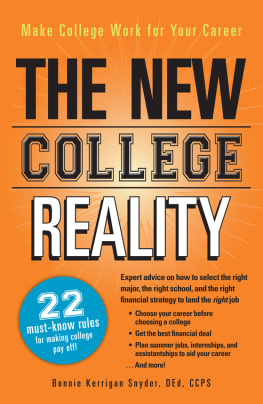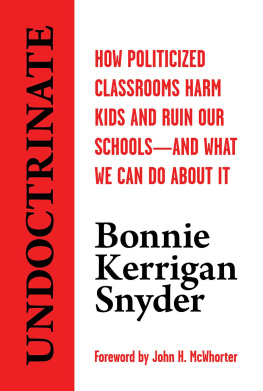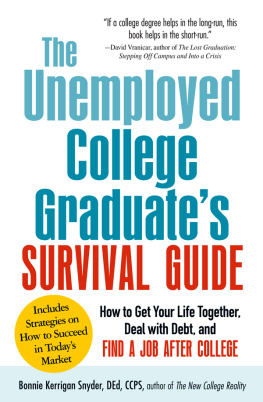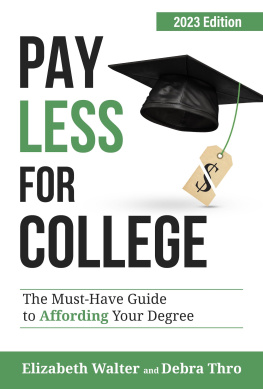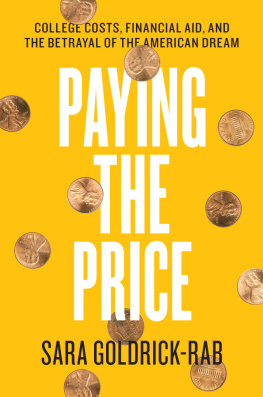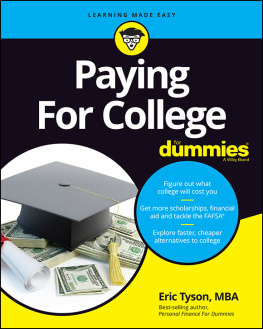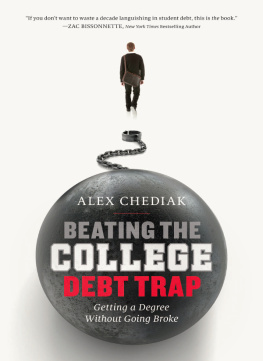Bonnie Snyder has done a masterful job in offering first-rate advice to students and families who want to make college a financially rewarding experience, instead of a costly monetary albatross.
Dr. Richard Vedder, Founder and Director of the Center for
College Affordability and Productivity and Distinguished
Professor of Economics, Ohio University
Dr. Bonnie Snyders terrific book provides outstanding guidance for navigating todays extremely challenging higher education and career environments.
Dr. Laurence Kotlikoff, Columnist for Bloomberg and
Professor of Economics, Boston University
The New College Reality gives tremendous insight into both the financial and the academic planning that families need in preparing for college. It is a must read for any family that is serious about their childrens college education.
Rick Darvis, CPA, CCPS, Co-Founder and Executive Director,
National Institute of Certified College Planners
Forget the classics. The New College Reality should be tops on all high school students summer reading lists. As a parent of a high school freshman and someone who has worked in the higher education field for over twenty-five years, I have never seen such insight into what is really important when preparing for college. I have traveled the country visiting colleges in forty-four states and recommend that no one sets foot on a college campus before reading Ms. Snyders book. This changes everything!
Stephen Elias, former College Administrator and
current Vice President of Planet Tuition
As the former Director of College and Career Counseling at a large public high school and as an admissions counselor, I meet with families everyday who are struggling with the looming financial burden of college tuition, the complex financial aid process, and the increasing pressure of college admissions. Dr. Snyders book shows effective strategies for families to rein in skyrocketing tuition by placing career planning as the cornerstone of college planning. The New College Reality is a thought-provoking, fresh voice for families, school counselors, and college admissions professionals.
Geoff Broome, Assistant Director of Admissions, Widener University
THE NEW
COLLEGE
REALITY
Make College Work for Your Career
Bonnie Kerrigan Snyder, DEd, CCPS

Avon, Massachusetts
DEDICATION
This book is dedicated to college-bound
high school students and their parents
FOREWORD
YESTERDAYS ADVICE IS NOT GOOD ENOUGH ANYMORE
W hen you start talking about college, whether youre a prospective student or the parent of one, youre sure to get a big dose of the conventional wisdom:
- A college degree will set you apart
- College will guarantee a good job
- Save money for college
- A college degree is always a good investment
- Student loans are good debt because you will easily be able to repay them with the higher earnings you can expect to receive as a college graduate
Most people accept and act on this advice without questioning or examining it, because it is so ingrained in our thinking. They consider these assertions self-evident.
These maxims still sound good, but as my own children approached college age, I began to suspect that many of these comfortable, timeworn statements just didnt apply anymore. For example, my friends and acquaintances might say that college is the route to a better life, but I knew many recent graduates who were stuck in low-paying jobs that dont require a college degree.
I watched as the children of friends and neighbors finished their degrees. Large numbers of them moved back home and took jobs in landscaping, retail, and food service. They could have acquired these jobs straight out of high school, but now they had to use a big part of their meager wages to pay back their hefty student loans. I also knew many college graduates, of all ages, who were unemployedsome of them for a year or longer. It became obvious to me that a college degree alone was no longer the sure ticket to the so-called good lifea middle-class job with benefitsthat it was a generation or two ago.
I thought back to my own college-to-employment experience. I grew up in a family that emphasized the importance of education, and the old ways of thinking about college had a big effect on me. I worked hard in school and matriculated as an undergraduate at Harvard. For the next four years I kept my head in a book and didnt pay much attention to the job market or economy. I trusted that my degree would take care of my employment prospects. Then I graduated into the recession that coincided with the stock market crash of 1987. To say this was a big wake-up call would be a dramatic understatement.
THE REALITY OF
POST-GRADUATION LIFE
I had assumed that if I graduated from an Ivy League institution, employers would be banging on my door, desperate to hire me. Through a misty haze I saw myself choosing between competing offers, effortlessly easing into a comfortable lifetime career.
It didnt quite turn out that way. During my initial job search I did a great deal of pavement pounding and found myself in several temp agencies. I quickly discovered that the world wasnt beating a path to my door, even with my freshly minted English degree. Becoming self-supporting was going to be harder than I had anticipated. My first offer was for an editorial assistant position with a publisher in New York City at $13,000 a yeara bad salary even in the late 1980s. Apparently, a college degree alone, even from an elite institution, was no guarantee of a high-paying job.
Flash forward to today. New college graduates face an even less welcoming job market. They hold record-breaking amounts of debt acquired in pursuit of degrees that may never give them the high salaries they anticipated. Instead of temp work, they are being offered unpaid internships. In the wake of the Great Recession of 20082009, the fierce competition for jobs shows no signs of abating any time soon.
Its a rare parent these days who does not feel anxious about her childs future prospects. The reality is that there are good reasons to worry. As I write, one in five Americans is unemployed or underemployed. Think college graduates are immune? Think again. Just 20 percent of graduating students who applied for jobs have one, according to the National Association of Colleges and Employers. This is down from 51 percent in 2007. Furthermore, these unemployed graduates do not show up in official unemployment numbers because in order to be counted as unemployed, you first have to have a job.
No longer can we sit back and safely assume that every college graduate is going to be well positioned to earn a salary sufficient to maintain a middle-class lifestyleor even to put food on the table, let alone pay back student loans. Higher education and the employment marketplace have changed so dramatically over the past generation that the old rules about college need a complete makeover to remain relevant. We need to consider what advice will help this generation of young adults to find success in the world as it is now.
Families have to take a fresh look at the college value proposition to confront these changed present-day realities:
- A college degree now costs more than ever, will not guarantee a job, and can be a risky investment, if you approach it imprudently.

